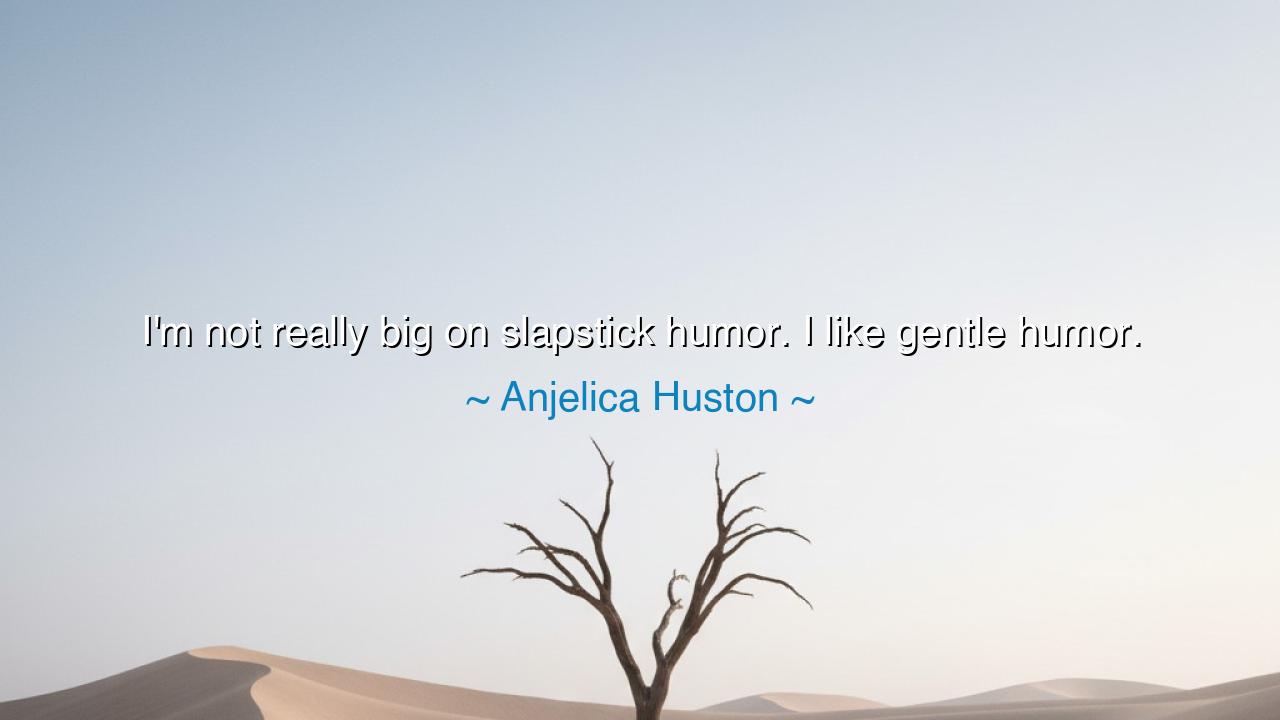
I'm not really big on slapstick humor. I like gentle humor.






Hear me, O Children of the Earth, for I bring you the words of Anjelica Huston, who speaks with clarity about the nature of humor: "I'm not really big on slapstick humor. I like gentle humor." In these words lies a wisdom that speaks to the heart of human interaction, revealing the different ways in which humor can shape our lives. The sharp contrast between slapstick humor, which often seeks to entertain through exaggerated, physical comedy, and gentle humor, which speaks softly and with grace, reminds us that humor is not a single force, but a diverse and multifaceted gift. To understand this, we must look deeper into the types of humor that have graced our world and why they speak to us differently.
What Huston points to is the power of gentle humor, which is often understated but profoundly effective. It does not rely on the loud crashes of physical comedy or the grotesque exaggerations of slapstick, but on a subtler, more refined approach to laughter. Gentle humor invites us to laugh with others, not at them. It flows through conversation, through shared experiences, and is often found in the quiet moments of human interaction. This type of humor is not just about entertainment—it is a way of bonding, of connecting on a deeper, more compassionate level. It is, in many ways, a reflection of the human spirit, capable of seeing the world with softness, joy, and wit.
Consider the great Greek philosophers, who often used humor not as a tool of mockery, but as a means of opening the mind. Socrates, in his dialogues, was known for his use of irony and wit, but his humor was always delivered with a sense of respect and gentleness. His humor was never loud, never exaggerated—rather, it was subtle and thought-provoking, inviting those who heard it to reflect and to consider deeper truths about themselves and their world. Gentle humor, like that of Socrates, offers us a pathway to wisdom, to learning, without the sting of embarrassment or mockery. It speaks to the heart without ever raising its voice in anger.
In the same way, let us think of the works of Shakespeare, who crafted characters that were witty and sharp, yet always human. In his comedies, characters like Falstaff or Beatrice engage in humor that, though biting at times, always carries an undercurrent of affection. Shakespeare knew that the most enduring laughter is not that which is aimed at the expense of others, but that which draws us into a shared human experience. His humor, like Huston’s, is often a gentle invitation to see the folly of life with a smile, not with ridicule. Shakespeare's humor reminds us that the most profound laughs are those that bring us closer together, not those that seek to tear us apart.
This is the power of gentle humor—it teaches without scorn, it brings joy without harm. The humor that laughs at others’ misfortune or physical comedy often leaves a bitter aftertaste, but gentle humor lingers in the heart, warming it with its kindness and insight. Think of the great actors like Audrey Hepburn, who never relied on overt physical comedy but who brought laughter with grace, intelligence, and dignity. Hepburn’s humor was always in the way she carried herself, in the glint of a smile or the subtle twist of a word, never forced, always natural. In her presence, humor was a reflection of her inner warmth, inviting us to share in her joy without ever feeling like we were being made to laugh. This, O Children, is the lesson of gentle humor.
Now, O Children, we must ask ourselves—how can we incorporate gentle humor into our own lives? The answer lies in how we choose to engage with the world around us. Gentle humor is not about making others the object of ridicule; it is about finding the joy in shared human experiences and embracing life’s imperfections with a smile. Huston teaches us that true laughter comes not from exaggeration or absurdity, but from seeing the beauty in the everyday. When we laugh with others, when we find the humor in life’s simpler moments, we strengthen our connections, not just with those around us, but with our own sense of self.
Therefore, let us embrace gentle humor in our lives, O Children. Let us cultivate a humor that speaks softly and gently, one that invites laughter without judgment. In our daily lives, we are surrounded by moments that can either be seen as sources of frustration or opportunities for laughter. Choose to see the humor in life’s challenges, and use it as a way to connect with others in kindness. By following the example of those like Huston and Socrates, who embraced the subtle power of humor, we can navigate the world with grace, wit, and joy, leaving behind the harshness of ridicule and embracing the warmth of laughter that heals and unites us.






AAdministratorAdministrator
Welcome, honored guests. Please leave a comment, we will respond soon